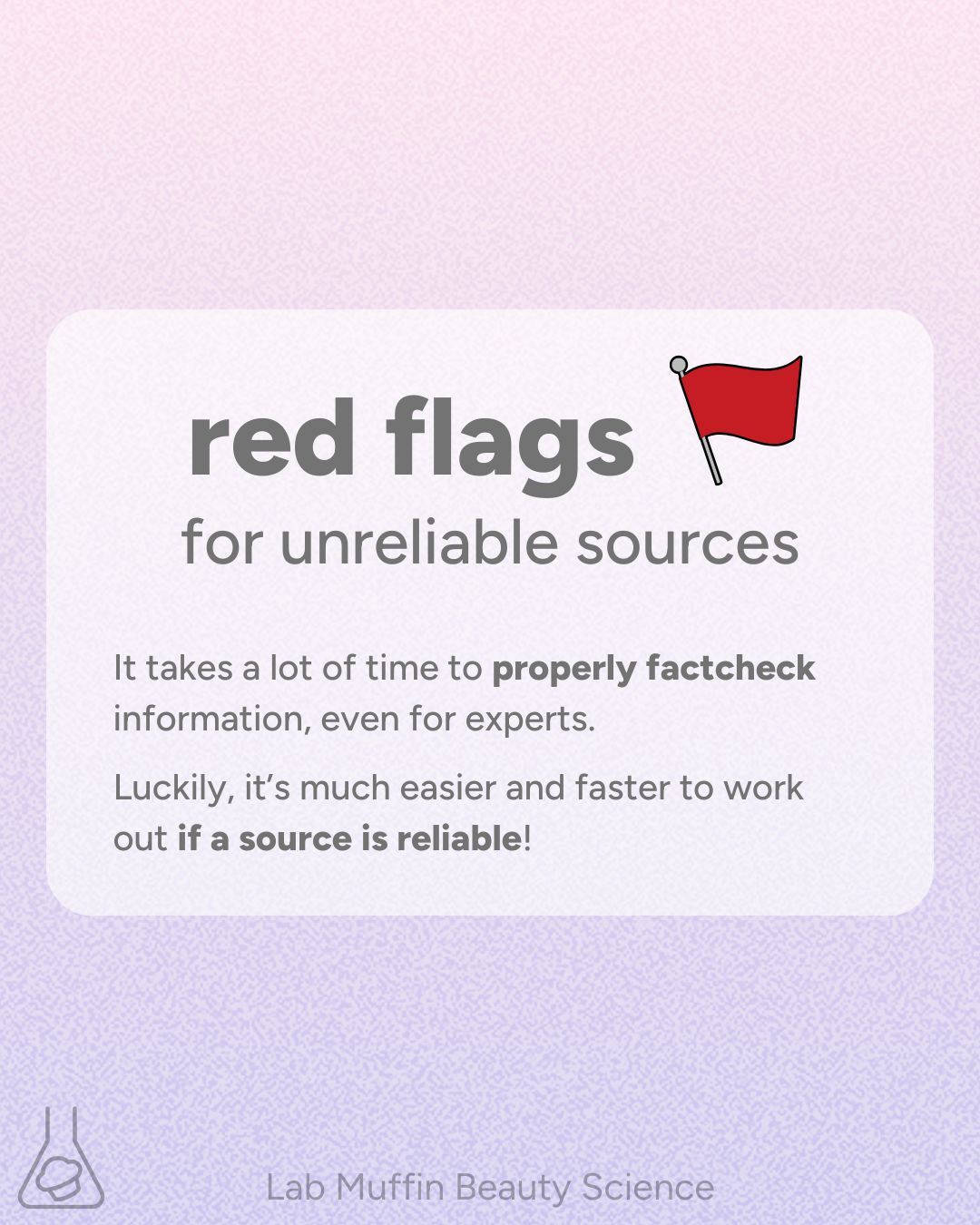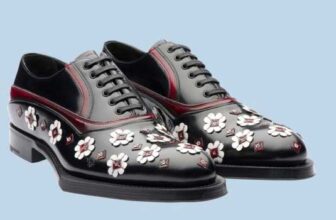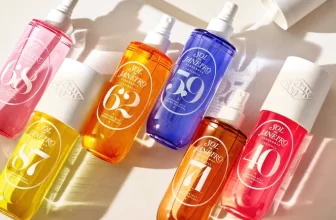
The best way to cite:
Wong M. Purple flags for unreliable sources: a information. Lab Muffin Magnificence Science. October 23, 2024. Accessed December 2, 2024.
https://labmuffin.com/red-flags-for-unreliable-sources-a-guide/
How do you examine if info is dependable? One shortcut that works effectively (more often than not) is to examine if the supply itself is dependable! That is a lot sooner and simpler than making an attempt to be taught the science behind an space you’re not already acquainted with – it takes a whole lot of time to correctly factcheck info, even for consultants.
Listed below are some pink flags to look out for with questionable sources in magnificence.
(This publish was impressed by a Threads publish by Jen of The Eco Nicely!)
Dishonest behaviour
This factors in the direction of a disregard for moral communication, and a lack of respect for his or her viewers and fact generally.
Examples to look out for:
- Extremely inconsistent opinions – altering your thoughts with new data is sweet, however altering an excessive amount of is an indication that some opinions aren’t held truthfully
- A sample of selling myths, then later pretending they knew all alongside after another person debunks it
- Undisclosed sponsorships and conflicts of curiosity
- #brandpartner or #advert hidden close to the underside of the caption on social media posts (and nothing else) when selling manufacturers or merchandise
- Affiliations on LinkedIn that aren’t disclosed on different platforms
- Dodgier content material on their TikTok account (typically seen as a platform the place you will get away with extra)
An enormous supply of misinformation are perceived consultants who behave dishonestly. Authority bias or the “white coat impact” means we’re extra more likely to consider individuals who look like consultants.
Individuals benefit from this by hiding what their {qualifications} truly are, or wildly inflating their credentials. For instance:
- Chiropractors pretending to be medical docs
- PhDs in irrelevant fields
- Presenting weekend programs like levels
Over-reliance on attraction to authority is one other massive one. For instance, individuals who continuously point out irrelevant {qualifications} of their content material, as an alternative of precise causes:
- “I’m a beauty surgeon, keep away from these sunscreens”
- “I’m a dermatologist, listed below are some product dupes”
This additionally makes it more durable for folks to grasp which consultants are essentially the most related ones for specific subjects, which makes it more durable for us to factcheck different info.
Plagiarism
Frequent examples with magnificence content material creators:
- Incessantly plagiarises/fails to credit score individuals who helped or “impressed” them
- Solely appears to quote scientific articles however has little related science background
Individuals usually plagiarise to look extra like an knowledgeable. You don’t disguise your sources in case you perceive the subject effectively sufficient to know you’re including worth along with your content material.
This establishes credibility – different folks consider them due to appropriate data they pretended was theirs. However as a result of they don’t perceive the subject, they get issues flawed and unfold misinformation – particularly once they begin to consider their very own hype.
Plagiarism additionally demotivates good data sources, who labored laborious however didn’t get the credit score (a giant reason for burnout). Finally this results in much less unique and correct info total, very like how generative AI content material is beginning to plagiarise different generative AI content material.
Different dangerous info
Everybody has blind spots and makes errors. But when somebody posts a whole lot of issues that you just already know are incorrect, their different info is probably going additionally questionable.
Jen of The Eco Nicely posted an important quick record:
- claiming mineral sunscreen is the “eco” choice
- saying mineral sunscreen works by reflection, “chemical” sunscreens take in
- self describing as a “clear magnificence chemist”
- utilizing EWG as a reference
- claiming the whole lot we stick on our pores and skin readily absorbs to our blood
- counting on ingredient lists as the idea for a product’s security, efficiency or sustainability
This actually isn’t exhaustive – I’ve a enormous again catalogue of mythbusting content material!
Test their mates
It’s a pink flag if somebody follows an honest handful of very sus folks (though in the event that they comply with a whole lot of very sus folks, they’re in all probability simply following dangerous sources to trace misinformation). It’s additionally a pink flag if somebody is sweet buddies with different questionable sources.
Once more, nobody is completely conscious on all fronts. But when somebody trusts many questionable sources, that’s an indication of poor judgement.
It’s additionally dangerous when different perceived consultants (who ought to know higher) endorse and platform dangerous sources. This superpowers misinfo with a double whammy of authority bias.
In the event that they’re prepared to sacrifice their very own requirements for clout, they in all probability have low requirements in different areas too (shoutout to Dr Rohin Francis of Medlife Disaster for this level!).





